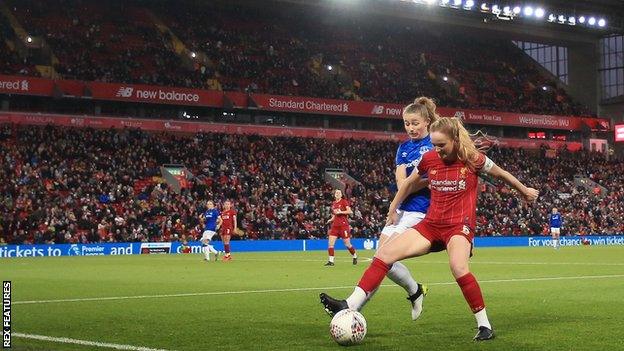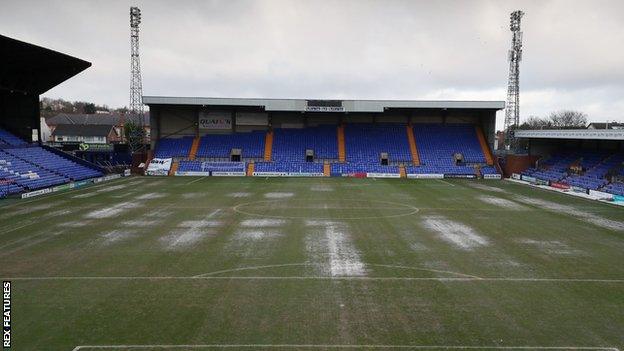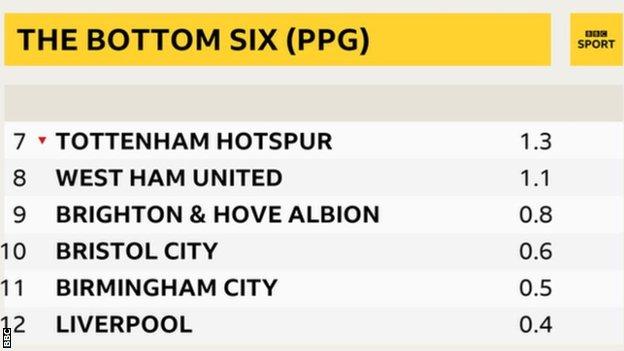Liverpool Women: Why were they relegated in same summer men's team won Premier League?
- Published

A crowd of 23,500 saw Anfield host its first WSL game in November 2019 but the Reds lost 1-0 to Everton
One Liverpool senior team are world, European and Premier League champions. The other have been relegated.
The disparity between the current circumstances facing Jurgen Klopp's flourishing men's team and the club's Championship-bound women's side feels vast.
When Vicky Jepson's side's relegation from the Women's Super League was confirmed in June, the club's owners were criticised by some for not investing more in the women's team. Undoubtedly, compared with WSL champions Chelsea, and title contenders Manchester City and Arsenal, it is true that Liverpool spend less.
However, four agents have told BBC Sport that, for the past 18 months, Liverpool have been offering players significantly better salaries than they would get at other bottom-half WSL teams - so they cannot be accused of having a wholly unambitious budget befitting bottom spot.
A goal drought, a soaked home pitch and a global pandemic all played their part in a tale that feels worlds away from the joy experienced by Klopp's side.
But how did one of the planet’s biggest football brands end up with a women's team, boasting the fifth best defensive record in the division, going down to the second tier in the only relegation place?
How big is the budget?
The accusation frequently thrown at Liverpool - who won back-to-back WSL titles in 2013 and 2014 - is that they do not invest sufficiently in their women's side.
If specifically compared with their men's team's closest rivals for silverware, they do not.
Liverpool Women's financial accounts for the year ending 31 May 2019 show they spent £733,257 on wages for the 2018-19 season, while Manchester City's accounts for the same period list their wage bill above £1.9m.
City's fellow WSL title challengers Chelsea and Arsenal's own spending also far surpasses the Merseyside club's.
However, when put up next to the teams they were ultimately battling relegation with this term, the Reds spent far more, with Birmingham City's wage bill for 2018-19 coming to £546,870, less than three-quarters of Liverpool's.
Those figures will differ to 2019-20's expenditure, when it is understood Liverpool's wage bill rose notably more than the Blues'.
Some will feel that comparing Fenway Sports Group-owned Liverpool with a Birmingham set-up whose men's Championship team were punished with a nine-point deduction in 2019 for losses of £48.8m over three years is wrong. Commentators and supporters understandably expect higher standards from the Reds.
Nevertheless, it is a widely held view that the Merseyside outfit financially supported Jepson's team enough, on paper, to avoid the drop and their transfer activity in 2019-20 is consistent with that.
Do you 'get looked after twice as well at Everton'?

Two of Liverpool Women's home games were postponed because of poor pitch conditions at Prenton Park, which the club shares with men's side Tranmere Rovers
But what about the environment the players and staff found themselves in off the field?
At Merseyside neighbours Everton, the women’s team share the Finch Farm training complex with their men’s side, and are understood to have full use of a swimming pool - something not available to the Reds, who share Tranmere Rovers' The Campus training complex in the Wirral and their Prenton Park ground, away from the men's team's Melwood base.
One agent, who did not wish to be named, told BBC Sport their players "could get paid more at Liverpool, but would be looked after twice as well at Everton", citing extensive off-field care and support.
However, Jepson's team are certainly not alone among the WSL's big names in training separately to their male counterparts - Manchester United being among the others.
Liverpool are into the final 12 months of a three-year deal to train at The Campus and it is understood the club are looking at options for future training facilities, with sources telling BBC Sport the Reds' new £50m Kirkby training ground is among those.
Before the 2019-20 season, there were also concerns about the amount of contact time Liverpool's players were getting.
In the Reds' financial accounts for 2018-19, it was stated their 19 players were "semi-professional and classed as part-time staff", stipulating full-time employees to work more than 20 hours per week.
Labelling the players that way in the accounts appeared at odds with 2018-19 having been the WSL's first fully professional season, with all players training full-time.
But BBC Sport understands the squad received an estimated 30 hours of contact time per week during the 2019-20 campaign.
If it was the case that contact time was below 20 hours per week in the previous season, that would not be a breach of the Football Association's licence requirements for "full-time" players, as FA rules state players needed a minimum of 16 contact hours per week in 2018-19 to count as fully professional, rising to at least 20 hours per week by the 2020-21 season, which Liverpool already exceed.
How a 'culture shift' saw 2018's accommodation concerns addressed
There are said to be more improvements coming soon off the field, despite relegation, and club staff speaking to BBC Sport from across the rest of the division have been full of praise for Liverpool Women's general manager, Adam Greaves-Smith, who was appointed in 2018.
However, before Greaves-Smith's arrival and an apparent culture shift, the reported situation was less-than satisfactory.
Former Leeds United men's team manager Neil Redfearn took charge of the club in 2018, but stood down after just two games of the 2018-19 season, reportedly because he felt the team were poorly supported by the club.
At the time, concerns had been raised about players' accommodation. That prompted what's been described by sources to BBC Sport as a "culture shift".
Liverpool Women players are now understood to be housed by the club in modern, riverside, city centre apartments as part of their contracts, which far exceed the accommodation reportedly provided at some other WSL teams., external
Nevertheless, despite improvements in Jepson and Greaves-Smith's time at the club, there have still been hints at dissatisfaction from outgoing players.
When Scotland's Christie Murray left the club this summer, she said on social media: "I'm looking forward to the opportunity to be in an environment that challenges me and, most importantly, to be able to enjoy what I love again."
Similarly, outgoing striker Courtney Sweetman-Kirk added on her social media accounts that it was "time for a new environment that challenges me as a player and a person".
A Liverpool spokesperson told BBC Sport: “LFC Women continues to be a priority for Liverpool FC and planning for next season in the Championship is already well under way.
"Although we do not discuss our finances in detail, over the past five years the financial investment in LFC Women has enjoyed significant percentage increases year on year, which demonstrates the continued support and long-term strategy for the team.
“Most importantly, LFC Women has the full backing of the wider football club with all internal departments supporting the women's team on a day-to-day basis."
A shortage of goals and six 1-0 defeats

The final WSL table
But what about performances on the pitch itself?
Conceding only 20 league goals last season, Jepson's side had the fifth-best defensive record in the top flight.
Of their 10 league defeats, seven came by slender one-goal margins, with six of those being 1-0 losses. Jepson's team appeared well-drilled and hard to break down.
The problem, statistically, was at the other end of the pitch.
The Reds scored only eight goals in their 14 WSL games, and half of those came in the final three games they played.
They found the net just once in their first eight matches of the campaign and mid-season signing Rachel Furness ended up as their top scorer, with four goals in four games.
Former Doncaster Rovers Belles star Sweetman-Kirk had been Liverpool's top scorer in 2018-19, impressing with 10 league goals, but did not find the net in any of her 11 WSL appearances last term.
She was not alone in being unable to score freely in 2019-20. Neither Jess Clarke nor Kirsty Linnett found the net in the league, while attacking midfielder Mel Lawley - arguably the club's marquee signing last summer - scored once in 14 league starts, Niamh Charles netted twice and pacy winger Rinsola Babajide scored once in 12 appearances.
As a team overall, goals proved hard to come by.
That appeared to be changing after an upturn in performances at the start of 2020, and January's win at relegation rivals Bristol City gave Jepson's team hope of getting out of trouble.
Then came the coronavirus pandemic, stopping the season with eight of the Reds' scheduled 22 games remaining.
More than a third of the season unplayed
After two months of deliberations, the FA ultimately decided to bring the season to an early end and - devastatingly for Liverpool - maintain the league's relegation spot, determining final standings using an average points-per-game system.
With the Reds bottom of the table and having playing a game more than 11th-placed Birmingham - who stood one point above them - they were relegated by 0.1 points per game, becoming the first former winners of the WSL, which began in 2011, to drop down to the Championship.
The new campaign, which is expected to start in September, could be pivotal for the club's future. They will be the clear favourites to earn promotion straight back to the top flight.
That might not be as easy as fans might hope, however, with Championship clubs including London City Lionesses and Leicester City busy with summer recruitment, and this year's promotion contenders Sheffield United and Durham likely to be strong challengers once again.
A Liverpool spokesperson added: "We are also looking to build on the commercial success of the team following partnerships with Standard Chartered, Joie and Avon. This is a key element to support the future growth of the team and help to bring commercial strength to the women’s game.
"We remain committed and determined, together with the support and continued investment from the club, to help this team do what every Liverpool football team should be doing; winning trophies and keep winning trophies."
Additional reporting by BBC Sport's Emma Sanders.